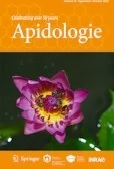Ver ítem
- xmlui.general.dspace_homeCentros e Institutos de InvestigaciónCICVyA. Centro de Investigación en Ciencias Veterinarias y AgronómicasInstituto de GenéticaArtículos científicosxmlui.ArtifactBrowser.ItemViewer.trail
- Inicio
- Centros e Institutos de Investigación
- CICVyA. Centro de Investigación en Ciencias Veterinarias y Agronómicas
- Instituto de Genética
- Artículos científicos
- Ver ítem
Age‑performance and intensity of grooming behavior toward Varroa destructor in resistant and susceptible Apis mellifera colonies
Resumen
Grooming behavior confers resistance to honey bees against Varroa destructor, being of interest to social immunity studies and breeding programs. The objective of this study was to characterize at the individual level the grooming behavior of mite-resistant (R) and susceptible (S) A. mellifera stocks from Argentina. Assays were performed in experimental arenas by applying two treatments to nurse bees: (1) placing a V. destructor mite on the bee’s thorax
[ver mas...]
Grooming behavior confers resistance to honey bees against Varroa destructor, being of interest to social immunity studies and breeding programs. The objective of this study was to characterize at the individual level the grooming behavior of mite-resistant (R) and susceptible (S) A. mellifera stocks from Argentina. Assays were performed in experimental arenas by applying two treatments to nurse bees: (1) placing a V. destructor mite on the bee’s thorax and (2) touching the bee with a paintbrush. Grooming reactions were recorded on bees from both stocks at the ages of 6, 10, and 14 days after emergence. R bees exhibited lower time of first response against the mite, performed more cleaning attempts, and used all their legs with a higher probability compared to S bees. The same pattern was evident when younger and older bees from the R stock were compared. The results demonstrate that bee age and genetic origin are critical factors of grooming behavior in honey bees.
[Cerrar]

Fuente
Apidologie 53 (5) : 59 (Octubre 2022)
Fecha
2022-10
Editorial
Springer
ISSN
1297-9678
Documentos Relacionados
Formato
pdf
Tipo de documento
artículo
Proyectos
(ver más)
INTA/2019-PE-E1-I017-001, Desarrollo del sector apícola organizado, sustentable y competitivo
INTA/2019-PD-E4-I079-001, Genética, genómica y ecología de insectos de importancia agronómica como insumo para el desarrollo de estrategias sustentables de control plagas
Palabras Claves
Derechos de acceso
Restringido
 Excepto donde se diga explicitamente, este item se publica bajo la siguiente descripción: Creative Commons Attribution-NonCommercial-ShareAlike 2.5 Unported (CC BY-NC-SA 2.5)
Excepto donde se diga explicitamente, este item se publica bajo la siguiente descripción: Creative Commons Attribution-NonCommercial-ShareAlike 2.5 Unported (CC BY-NC-SA 2.5)


